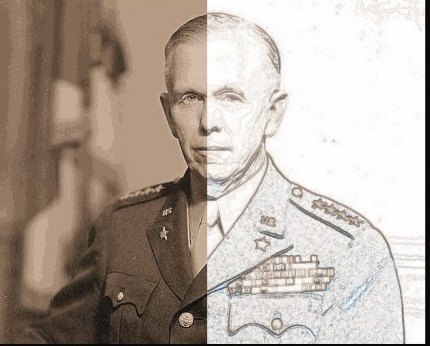
The term Marshall Plan refers to a U.S. policy following World War II. It was the brainchild of U.S. Secretary of State George C. Marshall (1880-1959), who proposed it during a speech at Harvard University on June 5, 1947. The idea was to help countries in Europe so that they did not fail or fall under communist influence. Here is a compressed account, along with links for further study:
About the general: Born in Uniontown, Pennsylvania, Marshall attended Virginia Military Institute before launching an impressive military career. He was a member of the staff of General of the Armies John J. Pershing during World War I and served as U.S. Army Chief of Staff during War World II. It was during the Second World War that he earned "a strong reputation as an administrator and successfully transformed a small peacetime army into a strong wartime force while also coordinating Allied operations," according to the U.S. State Department website. In 1947, he was tapped as the secretary of state under President Harry S. Truman and confirmed unanimously by the U.S. Senate.
A new challenge: The end of World War II in 1945 left Europe in tatters. There was cause for worry. "The Soviet Union’s control of Eastern Europe and the vulnerability of Western European countries to Soviet expansionism heightened the sense of crisis," recounts the U.S. National Archives and Records Administration website.
Enter, Marshall: The newly minted secretary of state envisioned an active response that would enable governments to recover. He wished to avoid missteps that followed World War I, when the Treaty of Versailles hit Germany with crippling war reparations.
"The truth of the matter is that Europe's requirements for the next three to four years of foreign food and other essential products -- principally from America -- are so much greater than her present ability to pay that she must have substantial additional help or face economic, social and political deterioration of a very grave character," he said during the address at Harvard. "Our policy is not directed against any country or doctrine but against hunger, poverty, desperation and chaos. Its purpose should be the revival of a working economy in the world so as to permit the emergence of political and social conditions in which free institutions can exist."
Congress acts: Six months after Marshall's address, on Dec.19, 1947, Truman "sent Congress a message that followed Marshall’s ideas to provide economic aid to Europe," the National Archives recounts. Congress passed the Economic Cooperation Act of 1948, which was to become known as the Marshall Plan.
The act spells out why assistance is important: "Congress finds that the existing situation in Europe endangers the establishment of a lasting peace, the general welfare and national interest of the United States, and the attainment of the objectives of the United Nations. The restoration or maintenance in European countries of principles of individual liberty, free institutions and genuine independence rests largely upon the establishment of sound economic conditions, stable international economic relationships, and the achievement by the countries of Europe of a healthy economy independent of extraordinary outside assistance." On April 3, 1948, Truman signed it.
The plan goes into effect: During the four years that followed, Congress appropriated $13.3 billion for European recovery, according to the archives. "This aid provided much needed capital and materials that enabled Europeans to rebuild the continent’s economy. For the United States, the Marshall Plan provided markets for American goods, created reliable trading partners and supported the development of stable democratic governments in Western Europe."
Another possibility:The Marshall Plan wasn't instituted just to help allies. It also helped Germany. Not everyone thought that was a good idea. In 1944 -- before the Marshall plan -- Henry Morgenthau Jr., secretary of the treasury (1891-1967), authored another plan to deal with Germany after the war. He proposed stripping Germany of its industrial capacity "so as to reduce the country to an agrarian state and also partition the country," recounts the Federal Reserve website. The plan was rejected.
To know more:
- The George C. Marshall Foundation: George Catlett Marshall.
- The George C. Marshall Foundation: The Marshall Plan speech.
- The George C. Marshall Foundation: Foreign Assistance Act of 1948, Economic Cooperation Act of 1948.
- Federal Reserve History.org: Henry Morgenthau Jr.
- U.S. National Archives and Records Administration: Bipartisan Foreign Policy -- The Marshall Plan
- U.S. Secretary of State, Office of the Historian: The Truman Doctrine and the Marshall Plan.
- U.S. Secretary of State, Office of the Historian: George Catlett Marshall (1880-1959).
Related:
NATO: Attack one member, attack them all
Versailles: A past that may be prologue
Like us on Facebook and tell us what you think.